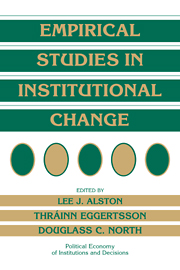Book contents
- Frontmatter
- Contents
- List of contributors
- Series editors' preface
- Acknowledgments
- Introduction
- A note on the economics of institutions
- Empirical work in institutional economics: an overview
- 1 Toward an understanding of property rights
- Economic variables and the development of the law: the case of western mineral rights
- 2 Impediments to institutional change in the former Soviet system
- Why economic reforms fail in the Soviet system: a property rights–based approach
- 3 Transaction costs and economic development
- Public institutions and private transactions: a comparative analysis of the legal and regulatory environment for business transactions in Brazil and Chile
- 4 The evolution of modern institutions of growth
- Constitutions and commitment: the evolution of institutions governing public choice in seventeenth-century England
- 5 Regulation in a dynamic setting
- The political economy of controls: American sugar
- 6 Price controls, property rights, and institutional change
- Roofs or stars: the stated intents and actual effects of a rents ordinance
- 7 Regulating natural resources: the evolution of perverse property rights
- Legally induced technical regress in the Washington salmon fishery
- 8 The politics of institutional change in a representative democracy
- A political theory of the origin of property rights: airport slots
- 9 The economics and politics of institutional change
- Paternalism in agricultural labor contracts in the U.S. South: implications for the growth of the welfare state
- Epilogue: economic performance through time
- Author index
- Subject index
- POLITICAL ECONOMY OF INSTITUTIONS AND DECISIONS
6 - Price controls, property rights, and institutional change
Published online by Cambridge University Press: 05 June 2012
- Frontmatter
- Contents
- List of contributors
- Series editors' preface
- Acknowledgments
- Introduction
- A note on the economics of institutions
- Empirical work in institutional economics: an overview
- 1 Toward an understanding of property rights
- Economic variables and the development of the law: the case of western mineral rights
- 2 Impediments to institutional change in the former Soviet system
- Why economic reforms fail in the Soviet system: a property rights–based approach
- 3 Transaction costs and economic development
- Public institutions and private transactions: a comparative analysis of the legal and regulatory environment for business transactions in Brazil and Chile
- 4 The evolution of modern institutions of growth
- Constitutions and commitment: the evolution of institutions governing public choice in seventeenth-century England
- 5 Regulation in a dynamic setting
- The political economy of controls: American sugar
- 6 Price controls, property rights, and institutional change
- Roofs or stars: the stated intents and actual effects of a rents ordinance
- 7 Regulating natural resources: the evolution of perverse property rights
- Legally induced technical regress in the Washington salmon fishery
- 8 The politics of institutional change in a representative democracy
- A political theory of the origin of property rights: airport slots
- 9 The economics and politics of institutional change
- Paternalism in agricultural labor contracts in the U.S. South: implications for the growth of the welfare state
- Epilogue: economic performance through time
- Author index
- Subject index
- POLITICAL ECONOMY OF INSTITUTIONS AND DECISIONS
Summary
RESTRICTING THE PRICE MECHANISM
Price control changes the structure of property rights and has complex economic consequences that often are unforeseen by economic actors. In a free market, before controls are instituted, prices allocate scarce resources among competing individuals according to the willingness and ability to pay. The question of who gets what is settled on the basis of individual preferences and purchasing power. However, the use of prices to ration the rights to scarce resources frequently conflicts with the selfinterest or ideologies of economic and political actors, who may seek to restrict or even abolish the price mechanism, at least in specific areas. The suspension of the price mechanism calls for some alternative method of rationing, such as direct assignment by the state, rationing by waiting, lottery, fistfights, or warfare. The alternative system of rationing can also be based on social norms and custom – which usually is the case, for example, within the family.
It is important to realize that the system used to ration economic resources affects not only the distribution of wealth in a community but also the overall level of wealth. The behavior of investors and producers is influenced by the methods used to reward them and their degree of control over inputs and outputs in production and so is also the supply of goods and services.
The authorities may interfere with the price mechanism either by subsidizing or restricting the demand and/or the supply of commodities or by directly controlling prices.
- Type
- Chapter
- Information
- Empirical Studies in Institutional Change , pp. 219 - 223Publisher: Cambridge University PressPrint publication year: 1996



